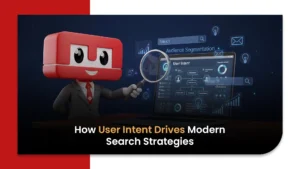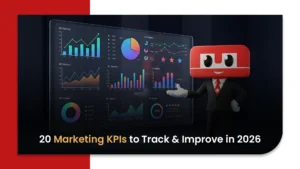
How to Optimize for Voice Search and Drive More Traffic in 2025
Typed searches are outdated now. Spoken queries are in. Here’s how to optimize your content for voice search and win the traffic game.
So here’s the kicker: voice search isn’t coming – it’s already here, and it’s making serious noise. From folks chatting up Siri to Gen Z asking Google Assistant where to get the best cold brew, voice search is changing how the internet hears and responds. If you’re not optimizing for it, you’re basically whispering in a world that’s shouting.
And for any Digital Marketing Agency in India trying to stay relevant in the algorithm jungle, this isn’t just a nice-to-have. It’s a must-do. Let’s unpack the future of SEO, one “Hey Alexa” at a time.
What Even Is Voice Search?
Imagine this: instead of typing “best Thai restaurant near me”, someone says, “Where can I get spicy Thai food nearby?”
See the difference? Voice search is:
- Conversational
- Intent-driven
- Longer (we love a long-tail queen).
It’s all about natural language. People talk to their devices like they’re people – because, well, they kinda are. Thanks to AI and machine learning, tools like Siri, Alexa, and Google Assistant are serving up results faster than you can say “OK Google.”
So yeah, voice search optimization 2025 isn’t futuristic fluff – it’s how your brand gets heard in the crowd.
Voice search is more natural and conversational, often used on-the-go with longer, question-based queries like “best café near me.” Text search, on the other hand, is shorter and keyword-focused, ideal for quick info and deeper research. Learn more about Voice Search vs. Text Search: Key Differences Marketers Must Know.
🎙️ Voice Search vs. ⌨️ Text Search

How Voice Search Actually Works (Without Melting Your Brain)
Voice search is powered by:
- ASR (Automatic Speech Recognition) – turns your voice into text.
- NLP (Natural Language Processing) – interprets what you meant, not just what you said.
- Machine learning & algorithms – serve up the most relevant answers, real quick.
Voice assistants aren’t just pulling up random blogs – they’re scanning the web for fast, clear, mobile-ready answers. That’s where you come in.
The Real SEO Juice: Optimization Strategies That Actually Work
If you’re wondering how to rank for voice queries, listen closely. These strategies are your ride-or-die.
Target Long-Tail, Question-Based Keywords
People don’t talk in keywords -they talk in questions:
- “How do I improve websites for voice search?”
- “What are the best voice search SEO strategies?”
Use tools like AnswerThePublic, Semrush, or even Reddit to find those juicy, natural phrases. Then? Bake them into headers, FAQs, and conversational blog intros (like this one).
That’s conversational SEO techniques 101.
Go Hard on Local “Near Me” Searches
Fact: 58% of voice searches are local. People want stuff now and nearby. Your content needs to say, “Hey, we’re literally right here.”
Tips:
- Use location-based phrases like “top-rated digital marketing agency in Ahmedabad.”
- Claim and optimize your Google Business Profile.
- Drop pins in local listings and directories.
- Add schema markup with your business info.
That’s how you show up when someone asks, “Who’s the best Digital Marketing agency near me?”
Speed + Mobile = The New SEO Love Language
Voice searches almost always happen on mobile. If your site takes forever to load, Siri’s not waiting.
Checklist:
- Compress your images
- Trim the code fat
- Use a responsive, mobile-first design
- Leverage AMP (Accelerated Mobile Pages)
Page speed = ranking power, especially for voice.
Content + Technical SEO = Voice Search Gold
You can’t just blog and pray. Your content and backend game need to vibe together. Here’s the tea:
- Write how people speak. Use simple, conversational language. Think “How can I grow my Insta?” not “Instagram optimization techniques for user engagement.”
- Use structured data. Schema helps Google understand your content’s purpose. Recipes, reviews, FAQs—markup makes it all easier to index.
- Create content that answers. Featured snippets are voice search real estate. Answer questions in 40-50 words. Boom, you’re the chosen one.
If you’re wondering how to improve website for voice search, start with these technical fixes and voice-friendly vibes.
Local SEO for Voice: Be the Big Fish in Your Neighborhood Pond
Want your agency to dominate local voice search? It’s all about showing up in hyper-relevant, location-based queries.
Do this:
- Keep your NAP (Name, Address, Phone) consistent everywhere
- Get listed on Yelp, Justdial, Sulekha, and other local sites
- Create blog content around local events, industry trends, or neighborhood pain points
- Use geo-modified keywords like “SEO agency for small businesses in Mumbai”
This helps boost your Alexa & Google Assistant SEO tips game, especially when users ask: “What’s the best place for digital marketing in my city?”
Trends, Baby. Where’s Voice Search Going in 2025?
Look, this world moves fast, but we’re always two steps ahead.
Trends to Watch:
- Voice + AI + Visual Search = triple threat. Get ready for voice searches that include images or video.
- Multi-language voice search. India is hella diverse. Think Hindi, Tamil, Bengali—voice search is going multilingual.
- Voice commerce. Shopping via voice is blowing up. Get your product pages ready for spoken queries.
Mistakes to Avoid:
- Keyword stuffing. Google sees through it, and Alexa hates it.
- Ignoring user intent. Just because you rank doesn’t mean you’re relevant. Know your audience’s why.
- Forgetting Technical SEO. A beautiful blog that loads like a snail is useless.
You’re here to slay, not spray and pray.
The Ending Words
Here’s the bottom line: Voice search is the next frontier of digital domination. And optimizing for it isn’t just about tweaking content- it’s about rethinking how people search, speak, and interact.
If you’re a digital marketing agency in India looking to crush it in 2025, now’s the time to make voice part of your SEO DNA. From voice search keywords for SEO to conversational SEO techniques, the opportunities are loud and clear.
Speak your brand’s truth. Write like people talk. Optimize like a boss.
And when Siri comes calling? You’ll be the one getting all the clicks.
Voice search optimization means making your website and content easy to find and understand when people use voice assistants like Siri, Alexa, or Google Assistant to search online. Instead of typing a few keywords like “best shoes,” people speak full sentences like “What are the best running shoes for flat feet?”
It’s important for SEO because:
More people are using voice search, especially on mobile devices and smart speakers.
Voice searches often lead to quick decisions (like calling a business or visiting a website).
Google and other search engines prefer content that gives clear, direct answers.
The biggest difference is how people talk versus how they type. When typing, people use short phrases like “weather New York.” But when speaking, they ask full questions like “What’s the weather like in New York today?”
Here’s how they differ:
Voice searches are longer and more conversational.
Voice uses questions like who, what, where, when, why, and how.
Voice searches are often local, such as “Where’s the closest coffee shop?”
Users expect quick, spoken answers, not long webpages.
Here are some easy and effective tips:
Use natural language: Write the way people speak. Avoid complicated words.
Answer questions directly: Create a FAQ section or add Q&A-style content.
Focus on long-tail keywords: Use phrases like “how to bake a chocolate cake” instead of just “chocolate cake.”
Optimize for featured snippets: Give short, clear answers at the start of your content. Google often reads these out loud in voice search.
Make your site mobile-friendly: Most voice searches come from mobile, so your site should load fast and be easy to use.
Use structured data (schema markup): This helps Google understand your content better.
Improve local SEO: Claim your Google Business Profile and use local keywords if you target a local audience.
Voice search is great for local businesses because many people use it to find places nearby. For example, someone might say, “Where can I get my phone repaired near me?”
Here’s how local businesses can benefit:
More visibility: You can show up in local results when people search for services in your area.
More foot traffic: Voice searches often lead to in-person visits.
Faster customer actions: People can call or get directions with just one voice command.
To take advantage, make sure your business info is correct online (name, address, phone number), use local keywords, and create content that answers local questions.
Here are some helpful tools:
Google Search Console: See what keywords people use to find your site and monitor performance.
Answer the Public: Shows you the exact questions people ask about a topic—great for voice content ideas.
SEMrush or Ahrefs: These SEO tools help you find long-tail and question-based keywords.
Google My Business (now Google Business Profile): Helps you show up in local voice searches.
Schema.org markup testing tool: Use this to check if your structured data is correct for better voice visibility.

What started as a passion for marketing years ago turned into a purposeful journey of helping businesses communicate in a way that truly connects. I’m Heta Dave, the Founder & CEO of Eta Marketing Solution! With a sharp focus on strategy and human-first marketing, I closely work with brands to help them stand out of the crowd and create something that lasts, not just in visibility, but in impact!

How User Intent Drives Modern Search Strategies

20 Marketing KPIs to Track & Improve in 2026


